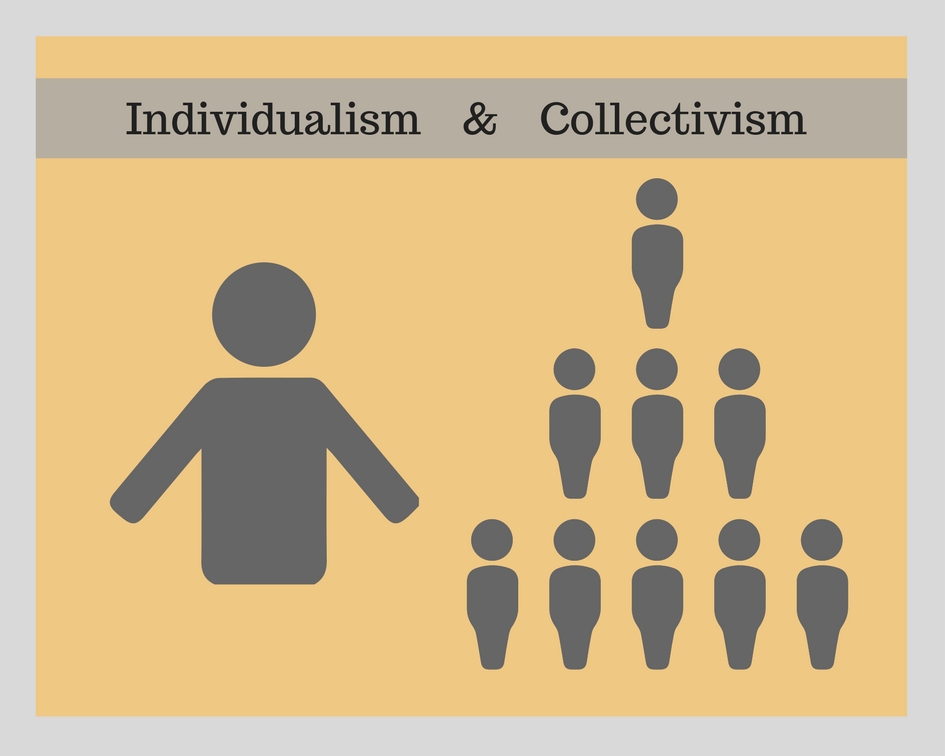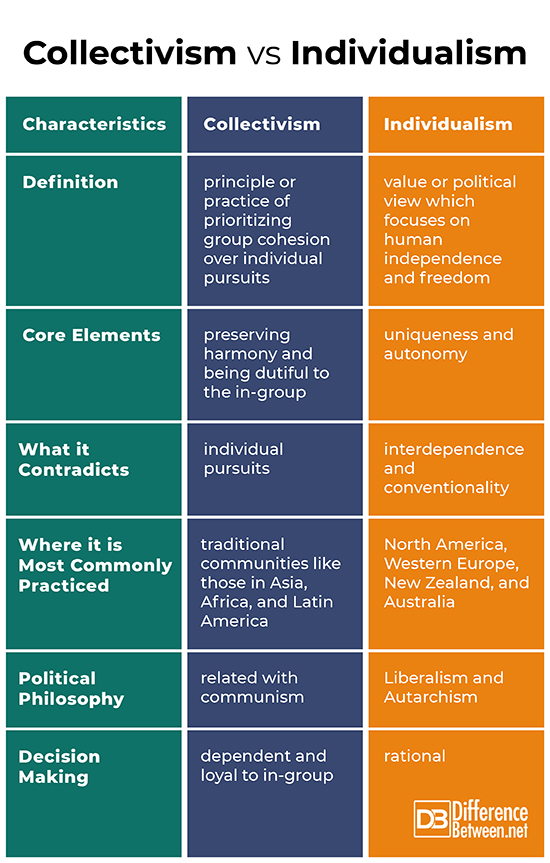Difference Between Collectivism and Individualism
Both collectivism and individualism are principles, practices, political theories, and cultural patterns. They are often viewed as being in contrast with each other. Collectivism prioritizes group cohesion over individual pursuits, and it sees long-term relationships as essential since it promotes group goals. On the other hand, individualism focuses on human independence and freedom. It is generally against external interferences regarding personal choices. The following discussions further delve into these distinctions.

What is Collectivism?
Collectivism is the principle or practice of prioritizing group cohesion over individual pursuits. It views long-term relationships as essential since it promotes group goals. The people in a collectivist society can easily sacrifice their individual benefits for the sake of the whole society’s progress. As a matter of fact, an individual with a collectivist attitude may even feel embarrassed if he or she is singled out to be commended. A study on decision-making reported that those with higher levels of collectivism tend to be more dependent and are less likely to betray members of the central ingroups (Le Febvre & Franke, 2013). Collectivism is a cultural pattern commonly observed among traditional communities like those in Asia, Africa, and Latin America. It is the opposite of individualism which is common in North America, Western Europe, New Zealand, and Australia (Triandis, 2001).
Collectivism is also a political theory which is related with communism since it proposes that power should be placed in the hands of the citizens as a whole instead of in the hands of only several individuals such as those in the upper class. Hence, it is beneficial to construct a system which facilitates shared goals. However, this ideal is difficult to actualize as evidenced by the Soviet communism’s attempted collectivist society.

What is Individualism?
Individualism is a value or political view which focuses on human independence and freedom. It is generally against external interferences regarding personal choices. A research on decision-making concluded that those with higher levels of individualism tend to be more rational than those with higher levels of collectivism (Le Febvre & Franke, 2013). Societies with individualist cultures view people as autonomous and prioritize uniqueness. Individualism disagrees that religion and tradition can dictate individuals’ limitations. It contradicts the views of collectivism which gives prime importance to interdependence and conventionality. The term was reportedly first used as a pejorative term, largely in the sense of political individualism which theorizes that the government should merely take a defensive role by shielding the individual’s liberty to act as how he wants to as long as he also respects the other individual’s freedom.
It was observed that there is an increasing pattern of individualism across the globe and that it is likely associated with a similarly increasing socioeconomic development which is evidenced by higher household income, education levels, and proportion of white-collar occupations. However, it was noted that China is an exception to the pattern since their individualistic culture was found out to decrease despite their economic growth. This may be due to their complex socioeconomic history (Association for Psychological Science, 2017).
Difference between Collectivism and Individualism
Definition
Collectivism is the principle or practice of prioritizing group cohesion over individual pursuits. On the other hand, individualism is a value or political view which focuses on human independence and freedom.
Core Elements
Collectivism’s core elements are preserving harmony and being dutiful to the in-group. On the other hand, those of individualism are uniqueness and autonomy.
What it Contradicts
Collectivism is against individual pursuits as it advocates sacrifice for the greater good. In comparison, individualism disagrees that religion and tradition can dictate individuals’ limitations. It contradicts the views of collectivism which gives prime importance to interdependence and conventionality.
Where it is Most Commonly Practiced
Collectivism is a cultural pattern commonly observed among traditional communities like those in Asia, Africa, and Latin America. It is the opposite of individualism which is common in North America, Western Europe, New Zealand, and Australia. However, it was observed that there is an increasing pattern of individualism across the globe and that it is likely associated with a similarly increasing socioeconomic development.
Political Philosophy/Theory
Collectivism is also a political theory which is related with communism since it proposes that power should be placed in the hands of the citizens as a whole instead of in the hands of only several individuals such as those in the upper class. Hence, it is beneficial to construct a system which facilitates shared goals. In comparison, individualism is associated with liberalism which places importance on individual freedom which was recognized specially since the Enlightenment. It is also related with autarchism which rejects compulsory government and promotes self-reliance and individual freedom.
Decision-Making
A study on decision-making reported that those with higher levels of collectivism tend to be more dependent and are less likely to betray members of the central ingroups while those with higher levels of individualism tend to be more rational (Le Febvre & Franke, 2013).
Collectivism vs Individualism

Summary
- Both collectivism and individualism are principles, practices, political theories, and cultural patterns.
- The people in a collectivist society can easily sacrifice their individual benefits for the sake of the whole society’s progress.
- Individualism is generally against external interferences regarding personal choices.
- There is an increasing pattern of individualism across the globe and that it is likely associated with a similarly increasing socioeconomic development.
- Collectivism prioritizes group cohesion over individual pursuits while individualism focuses on human independence and freedom.
- Collectivism is commonly observed in Asia, Africa, and Latin America while individualism is more common in North America, Western Europe, New Zealand, and Australia.
- Collectivism is related with communism while individualism is associated with liberalism and autarchism.
- Those with higher levels of collectivism tend to be more dependent and loyal to the in-group while those with higher levels of individualism tend to be more rational in terms of their decision-making.
- Difference Between Hematoma and Melanoma - February 9, 2023
- Difference Between Bruising and Necrosis - February 8, 2023
- Difference Between Brain Hematoma and Brain Hemorrhage - February 8, 2023
Search DifferenceBetween.net :
1 Comment
Leave a Response
References :
[0]Association for Psychological Science. Individualistic Practices and Values Increasing Around the World. 2017, https://www.psychologicalscience.org/news/releases/individualistic-practices-and-values-increasing-around-the-world.html
[1]Le Febvre, Rebecca and Frank, Volker. Culture Matters: Individualism vs. Collectivism in Conflict Decision-Making. Societies, 2013, 3, 128–146; doi:10.3390/soc3010128
[2]Triandis, H.C. Collectivism: Cultural Concerns. International Encyclopedia of the Social and Behavioral Sciences, 2227-2232.
[3]Image credit: https://live.staticflickr.com/4134/4782591130_92df5424b6.jpg
[4]Image credit: https://commons.wikimedia.org/wiki/File:Individualism_%26_Collectivism.jpg

Thank you, this is really helpful.